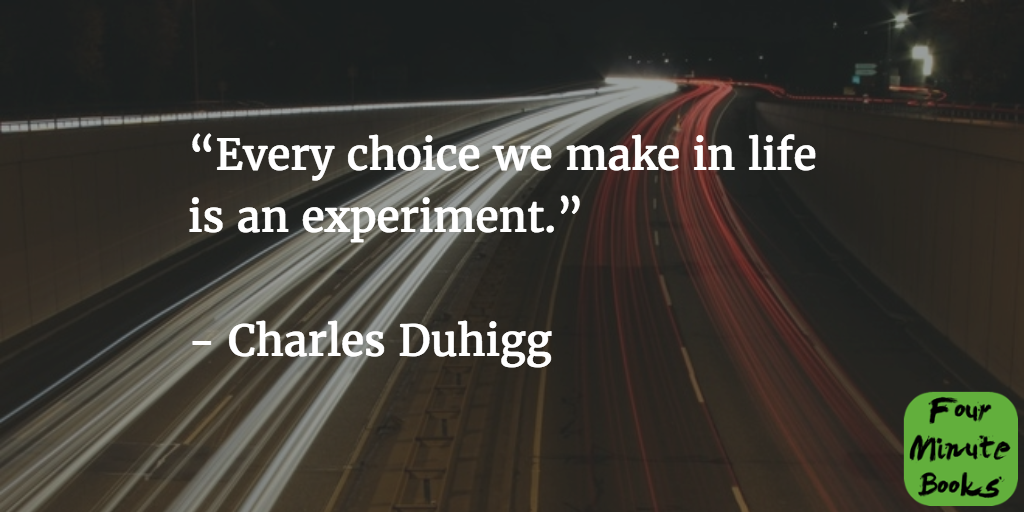1-Sentence-Summary: Smarter Faster Better tells deeply researched stories from professionals around the world to show you how to do what you’re already doing in a better, more efficient way, by focusing on decisions, motivation and the way we set goals.
Read in: 4 minutes
Favorite quote from the author:

Audio Summary
Listen to the audio of this summary with a free reading.fm account:
The Power of Habit is one of my favorite books of all time. So much in fact, that I’ve given away several copies over the last year. In March 2016 Charles Duhigg finally published his next book. I don’t mind that it took four years though, because I know it’s the only way for Charles to go as deep as he does in his research and preparation.
Smarter Faster Better is slightly more focused on businesses and teams, but holds just as much valuable information for individuals. His first book was about why we do what we do. This one’s about how to do what you do in a better way.
Here are 3 lessons about motivation and goal-setting to help you live smarter, faster and better:
- Remind yourself of long-term goals to stay motivated.
- Use the SMART goal framework to set big goals and break them down into small chunks.
- Anticipate distractions.
Ready to start chipping away at those big dreams of yours? Let’s go for it!
Lesson 1: Use small reminders to stay motivated for long-term goals.
Setting goals is fun. Setting big goals is even more fun. Everyone loves it. Especially with December 31st approaching, millions of people set out for grand achievements…
…and then they fail.
Why?
Because while setting a huge goal is fun, working every day for years to achieve it isn’t.
It was easy for me to say: “You know what? I’ll just write 365 book summaries next year. I’ll publish one every single day.” The hard part is still showing up every day, after over 6 months, and actually writing them.
What helps me stay on track (most of the time anyways), is envisioning and reminding myself of the goal. There’s a number in my site’s dashboard, which shows how many posts I’ve written. I want to log in at the end of the year and see a big, fat, 365 standing there.
You can stay motivated when working towards a big goal too, as long as you keep reminding yourself what you’re working towards.
For example, if you want to come up with a crazy good new set of headphones, which adapts to people’s individual hearing, you’ll probably have to start with reading a lot of scientific research papers. These are often boring, and likely to put you to sleep. Writing “This will help me build the world’s best headphones” in big, bold letters across the top will help remind you of the paper’s purpose and get you to pull through.
Lesson 2: Set goals with the SMART goal framework to make them manageable.
Aside from staying motivated on goals, which take a while to accomplish, it also helps to break them down into manageable chunks. Big goals shouldn’t scare you, tackling them without a plan is what to be afraid of.
Charles Duhigg suggests something called the SMART goal framework, which is an acronym for the five criteria your goals should fulfill:
- Specific.
- Measurable.
- Attainable.
- Realistic.
- Time-bound.
For example, if you want to write a book, you can first be specific by saying you’ll write a book about habits, that spans three parts with 30 chapters, with no more than 300 pages in total. Your progress then becomes measurable, and you can strive to write, say, two page drafts every day. This goal is attainable, but you should still stay realistic about it: you probably won’t be able to write that much every day and lots of edits will have to be done, so you’ll likely take longer than just 150 days, but that’s alright, because at least you now have a time-bound schedule – even if it changes over time (and it will) you can already see the finish line of your goal.
Note: John Lee Dumas from Entrepreneur On Fire has created a really cool tool called The Freedom Journal, to help you set and stay on track with your SMART goals.
Lesson 3: Deal with distractions in advance by making a plan for when they occur.
There’s a famous Woody Allen quote:
“If you want to make God laugh, tell him about your plans.” – Woody Allen
While a good plan is nothing to scoff at, it’s true that no plan ever gets executed exactly as planned. Distractions, unforeseen problems and speed bumps will happen, and though you can’t possibly prepare for all of them, anticipating some of them in advance is your best bet at sticking to the schedule.
For example, if you know that at least one day each week gets sucked up entirely by responding to emails and phone calls, you’d be best off by blocking your emails from hitting your inbox during the time you’ve scheduled for writing your two daily pages.
Anticipation is the enemy of distraction. The best way to deal with distractions is to keep them from happening in the first place, whenever you can.
Smarter Faster Better Review
I’m not going to waste a lot of time discussing this. Charles Duhigg is gold. Just go and get Smarter Faster Better!
Audio Summary
Listen to the audio of this summary with a free reading.fm account:
Who would I recommend the Smarter Faster Better summary to?
The 17 year old with an idea for an app in his head, that he gets laughed at for, the 29 year old journalist, whose articles always take twice as long to publish than her original estimate, because of distractions, and anyone who has repeatedly screwed up their New Year’s Resolutions.
Last Updated on August 1, 2022